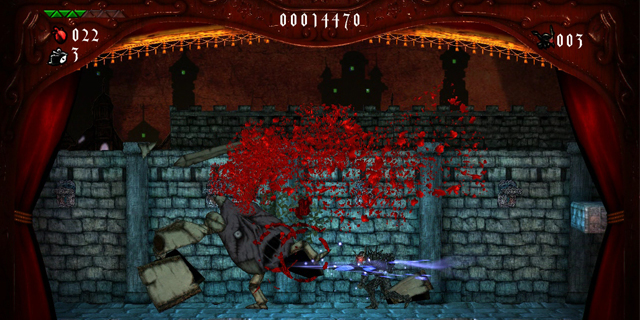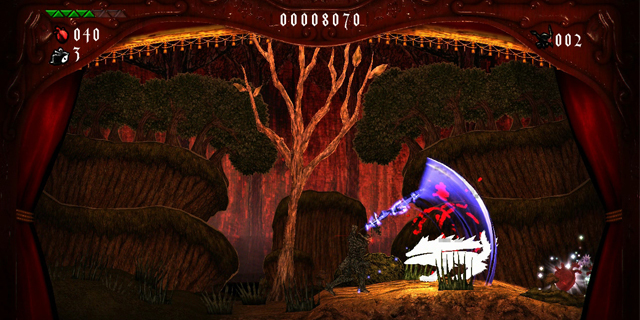
A great aesthetic can go a long way.
Black Knight Sword is the latest affront to convention from Grasshopper Manufacture, and is the developer’s second collaboration with Digital Reality (the first being Sine Mora). Black Knight is a downloadable title, offering to show what Goichi Suda (Suda 51) and his cohorts can do when not struggling against budget restrictions while trying to achieve AAA status.
The stage is set quite literally as the game opens along with bright red curtains, revealing a look that combines a European puppet show style with Japanese papercraft, which along with a profusion of macabre imagery create a unique look and feel for what may otherwise have seemed boring at a glance. The narrative, which is at times intriguingly subtle and others attacking the player with its surreal horrors, begins with a man hanging himself in a seedy motel room. A powerful force ostensibly brings him back to life and transforms him into the mysterious Black Knight, guiding him along a strange and horrific new world bereft of any notion of sanity towards an unknown goal.

Each stage is prefaced by an offbeat fairy tale, similar to the stories found in Shadows of the Damned (a previous work of Grasshopper’s), which foreshadows both the theme of the stage and the boss a the end. Akira Yamaoka continues to contribute his musical brilliance here, with ominous sounds that fit in with the European puppet show theme as well as make the player feel as uncomfortable as possible. The whimsically-nightmarish package delivered with the presentation is what really makes Black Knight Sword. The gameplay, however, struggles to find its own spot outside of the box.
Black Knight largely seems to be a crazy, Grasshopper tribute to the action platformers of the eighties, such as Castlevania, Mega Man and especially Ghosts’n Goblins. The Black Knight himself is very reminiscent of Sir Arthur, making sharp, jagged movements as he jumps around and flails his weapon unprofessionally in multiple directions. He rapidly thrusts his sword forward rather than slashing, and you can aim the direction of the attack up, down and (within limitations) diagonally. He has an awkward but effective double jump (not unlike that of Sir Arthur), but can also dodge, which has the bizarre input of holding down and pressing the jump button. It is fairly counterintuitive and is also very off-putting, considering that other buttons remain unmapped.
As an enemy is defeated, the Black Knight can snag their still-beating heart (or hearts) in an amusing nod to Castlevania, and use those hearts at specific points (feeding them to a creature resembling a ferris wheel with mouths instead of seats) to purchase stat upgrades and restock health or magic. The only changes to the Black Knight’s combat aptitude come in the form of new skills acquired after boss fights. Other than improving your maximum health, the only other significant purchasable upgrade is a temporary armor boost, so the whole system is a little underwhelming which could have been avoided by offering more than one weapon to fight with. That said, each new skill is unique and useful, so the system works, even if it feels a little too basic.
All in all, Grasshopper seems to have phoned it in a little on this one. Black Knight Sword is certainly a solid game, but it relies a little too heavily on its wild aesthetics, which we should all expect from Grasshopper at this point. What it lacks are the unique gameplay mechanics that typically accompany the unconventional window dressing. In spite of that, the context of all of this is a ten-dollar downloadable title, which comes with a slightly different set of expectations than those of a full retail release. I can confidently say that those expectations are met and, in a few areas, surpassed.
Pros: Brilliant setting, style, and soundtrack. Fun nods to past classics, great price
Cons: The unique style of the game betrays the uninspired mechanics; incredibly short



















